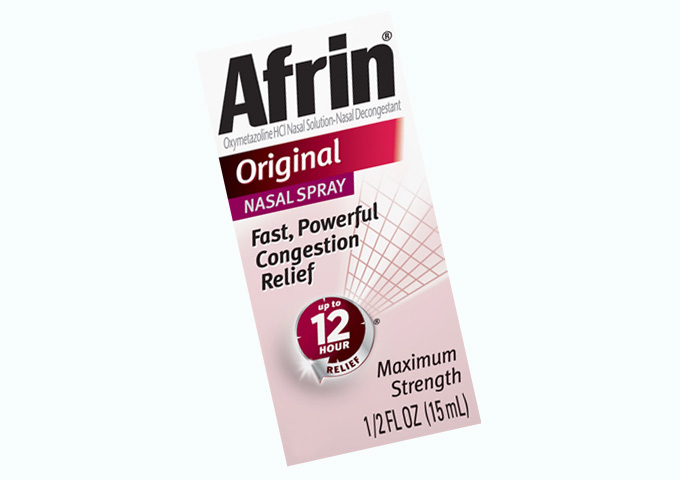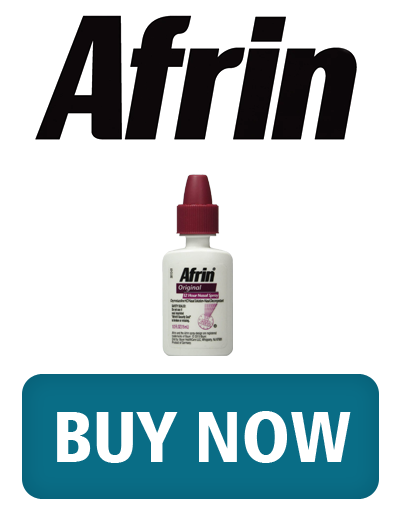Afrin (Oxymetazoline)
Afrin is a medication commonly used as a topical decongestant. It is often found in nasal sprays and nasal drops and is used to relieve nasal congestion caused by conditions like the common cold, allergies, and sinusitis. The drug works by narrowing the blood vessels in the nasal passages, reducing swelling and congestion.
Uses
Drug has several medical uses, primarily as a topical nasal decongestant. Some of its main uses include:
- Nasal Congestion Relief: Afrin is commonly used to alleviate nasal congestion caused by various conditions, such as the common cold, allergies (hay fever), sinusitis, and other upper respiratory infections. It helps to shrink swollen blood vessels in the nasal passages, reducing inflammation and opening up the airways for easier breathing.
- Nasal Allergy Symptom Relief: People with seasonal or perennial allergic rhinitis (hay fever) often experience nasal congestion as a symptom. Afrin nasal sprays can provide temporary relief from congestion due to allergies.
- Sinus Congestion Relief: Afrin is also used to relieve sinus congestion associated with sinusitis, a condition characterized by inflammation and infection of the sinuses.
- Preoperative Use: In some cases, Afrin nasal sprays are used before certain nasal surgeries or procedures to help shrink the nasal tissues and improve visibility for the surgeon.
It's important to note that Afrin is typically recommended for short-term use (usually no more than three to five days) to prevent the development of "rebound congestion" or worsening of symptoms after discontinuation. Prolonged use can lead to nasal tissue tolerance and dependence, making it less effective over time.

Dosage
The dosage of Afrin can vary depending on the specific product and the age of the individual using it. Here are some general guidelines for the dosages nasal sprays or drops:
For Adults and Children over 6 years old:
- The typical dose is 2 to 3 sprays or drops in each nostril every 10 to 12 hours, as needed for nasal congestion relief.
- Do not use for more than three days in a row.
For Children between 2 and 6 years old:
- The recommended dose is usually 1 to 2 sprays or drops in each nostril every 10 to 12 hours, as needed for nasal congestion relief.
It's important to use the correct formulation (nasal spray or drops) and adhere to the recommended frequency and duration of use to avoid potential side effects, such as nasal irritation or rebound congestion.
Additionally, individuals should not exceed the recommended dosage or use Afrin for extended periods. If the congestion persists or worsens after using nasal spray as directed, seek medical advice.
For children under 2 years old, it's crucial to consult a doctor before using any nasal decongestant as young children may be more sensitive to its effects.
Overdose
An overdose of Afrin can be dangerous and should be taken seriously. Overdosing on this drug can occur if someone uses more than the recommended dose or accidentally ingests the medication orally, which is not intended.
Symptoms of overdose may include:
- Severe nasal irritation or burning sensation
- Increased nasal congestion
- Headache
- Dizziness
- Nausea or vomiting
- Increased heart rate (tachycardia)
- High blood pressure (hypertension)
- Tremors or shakiness
- Difficulty breathing
- Seizures (rare, but possible in severe cases)
If you suspect an overdose of Afrin or someone has ingested it orally, seek immediate medical attention or contact your local emergency services. The person should be taken to the nearest hospital for appropriate evaluation and treatment.
It's essential to keep all medications, including nasal decongestants, out of reach of children and to use them strictly according to the recommended dosage and administration instructions. Overuse or misuse of Afrin can lead to rebound congestion and other adverse effects.
In case of any accidental ingestion or suspected overdose, call your local poison control center or go to the emergency room immediately. The sooner medical attention is sought, the better the chances of a positive outcome.
Precautions
When using Afrin or any medication, it's essential to take certain precautions to ensure safe and effective use. Here are some important precautions to consider:
- Follow Dosage Instructions: Always use Afrin according to the recommended dosage and administration instructions indicated on the product's labeling. Do not exceed the recommended dose or use the medication for an extended period without medical advice.
- Short-Term Use: Remedy is typically meant for short-term use only (usually no more than three to five days). Prolonged use can lead to "rebound congestion," where the nasal passages become more congested after discontinuing the medication. Avoid long-term or chronic use.
- Avoid Oral Ingestion: Afrin is designed for topical use in the nose and should not be ingested orally. Accidental ingestion can lead to systemic effects and adverse reactions. Keep the medication out of the reach of children to prevent accidental ingestion.
- Avoid Eye Contact: Do not apply Afrin directly to the eyes. If accidental eye contact occurs, rinse thoroughly with water and seek medical attention if necessary.
- Age Considerations: Use Afrin products specifically formulated for the appropriate age group. Follow age-specific dosing recommendations and avoid using adult products on children.
- Use as Directed: Never share Afrin with others, even if they have similar symptoms. Each person's condition may require different medications and treatments.
Side Effects
While not everyone may experience these side effects, it's essential to be aware of them. Common side effects of using Afrin nasal sprays or drops include:
- Nasal Irritation: Mild irritation or burning sensation in the nose can occur, especially if the medication is overused or used for an extended period.
- Dryness: Afrin can cause dryness in the nasal passages, leading to discomfort.
- Sneezing: Some individuals may experience increased sneezing after using Afrin.
- Temporary Stinging Sensation: Upon application, there might be a temporary stinging sensation in the nose.
- Rebound Congestion: Prolonged or excessive use of Afrin can lead to rebound congestion, where the nasal passages become more congested after stopping the medication.
- Headache: In some cases, Afrin use may be associated with headaches.
- Nausea: Nausea is a rare side effect but may occur in some individuals.
- Elevated Blood Pressure: Afrin can be absorbed into the bloodstream, potentially leading to increased blood pressure. People with hypertension should use this medication with caution.
- Dizziness: Some individuals may experience dizziness or lightheadedness after using Afrin.
- Sleep Disturbances: In rare cases, Afrin may cause sleep disturbances or difficulty falling asleep.
- Allergic Reactions: Although uncommon, some individuals may experience an allergic reaction to Afrin, resulting in symptoms such as rash, itching, swelling, severe dizziness, or trouble breathing. Seek immediate medical attention if you experience any signs of an allergic reaction.
Storage
Proper storage of Afrin nasal sprays or drops is important to maintain the medication's effectiveness and ensure its safety for use. Here are some guidelines for storing Afrin:
- Follow the Labeling Instructions: Always read and follow the storage instructions provided on the product's labeling or packaging.
- Store at Room Temperature: Store pharmaceutical product at room temperature, typically between 15°C to 30°C (59°F to 86°F).
- Keep Out of Reach of Children: Store the medication in a safe place, out of reach of children and pets, to prevent accidental ingestion.
- Protect from Light and Moisture: Keep the container tightly closed and protect it from light and moisture. Do not store Afrin in the bathroom or any other area with high humidity.
- Do Not Freeze: Avoid exposing Afrin to freezing temperatures, as this may affect its potency.
- Check Expiry Date: Ensure that the medication is within its expiration date before using it. Expired medications may not be effective and should be disposed of properly.
- Do Not Share: Do not share your Afrin with others, even if they have similar symptoms. Each person should use their own medication to avoid the risk of contamination.
- Proper Disposal: If the medication has expired or is no longer needed, dispose of it safely according to local regulations or guidelines. Do not flush medications down the toilet unless instructed to do so by the proper authorities.
